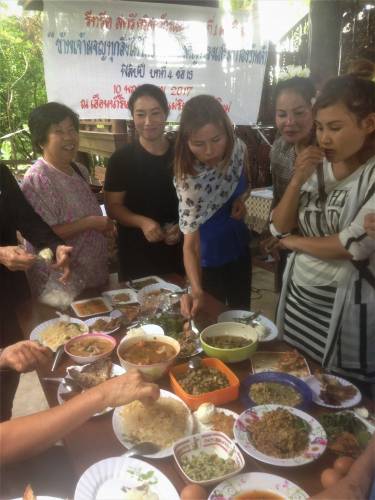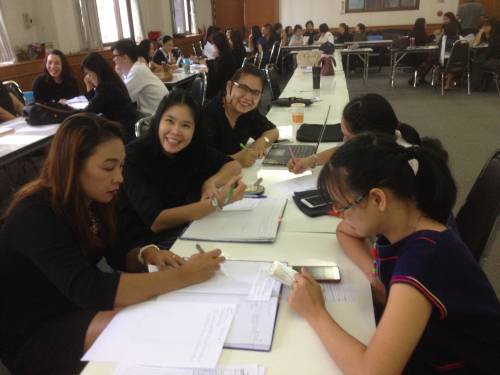A letter from Esther Wakeman serving in Thailand
June 2017
Write to Esther Wakeman (esther.wakeman@pcusa.org)
Individuals: Give online to E200327 for Esther Wakeman’s sending and support
Congregations: Give to D500900 for Esther Wakeman’s sending and support
Churches are asked to send donations through your congregation’s normal receiving site (this is usually your presbytery).
Dear friends,
“Thank you, Ajarn (teacher) Esther, you’ve helped me understand Jesus much better. I’ve never liked the stories of when he got angry and flipped all the tables in the temple or called the religious leaders snakes.” In Thailand, where displaying anger or other strong emotions is considered immature and not appropriate for anyone, much less a religious leader, these stories of Jesus are a problem for the typical person in the pew. On this occasion, I was speaking at a retreat for 90 women from the First District (a bit like a presbytery) of the PC(USA) partner church, the Church of Christ in Thailand, in Chiang Mai, Thailand, where I live and work. I had been invited to share a talk on learning to suffer like Jesus that I had given earlier to alumni of the McGilvary College of Divinity. In it I share some of the insights of Dr. Jim Wilder, one of the developers of the “Life Model,” which integrates scripture and brain research.
Jim teaches that when our brains are in relational mode, we see others as valuable people, we care about their thoughts and feelings, and we can stay relationally connected and collaborative, even in the midst of strong negative emotion. But when our brain switches out of relational mode, then we view others as problems to be fixed, criminals to be investigated and judged, and basically something we want to get rid of, if we can’t use them to our advantage in some way. This is the mindset that Jesus is warning against when he cautions us not to judge others. Jim says that God is always in relational mode toward us. Even when God may be deeply disappointed in our choices or angry about our behavior, God is still ready for relationship and sees us as precious. We see this most clearly on the cross, when Jesus is experiencing intense physical and emotional pain and he still has the capacity to forgive those killing him and to create a new spiritual family for his mother. At the retreat, I shared that even when Jesus was knocking over the tables and naming the nasty behavior of the religious leaders, I believe he was doing it in full relational mode—eyes full of love and heart yearning for them to repent. Because we see so few examples of this level of maturity—people who can stay relational in the midst of strong negative emotion—when we read Scripture, we imagine Jesus out of relational mode. But that is not how Jesus was.
Another woman at the retreat is an old friend who through poor choices and the “assistance” of loan sharks has gotten into huge debt. She’s applying for a government program aimed at helping hundreds of people in similar situations get low interest loans to help them get out of debt. She’s been berating herself for years for all that’s happened. During the retreat, I introduced a listening prayer approach that helps participants attune to God’s gracious and delighted heart for us. My friend experienced new depths of God’s love and mercy that assured her that no matter what happens, she is beloved by a good God. She received strength and hope for pursuing a path for justice. She likely was not the only woman at the retreat struggling financially and emotionally. We all need to take time to listen for and experience God’s love for us. It’s what changes us from the inside out so that we can become more like Jesus and share his heart with others.
Along with this work in a local presbytery, we continue to enjoy opportunities to share God’s love at Payap University, where I teach and serve as chaplain. Our Easter worship service this year included a fun Easter egg hunt for staff and a few of their children, too—celebrating the resurrection of Jesus and new life we have in him. I’ve also made visits to almost all the faculties and offices of Payap to share Payap’s core values that are rooted in the Christian faith and provide a chance to share what we believe. I also invite staff to think together about how they are using our core values in their life and work. These sessions are fun and encouraging—a bit out of the ordinary for a staff meeting—and they strengthen relationships among staff members.
Many of you have enjoyed the ministry of the Christian Communications Institute (CCI)—a ministry of Payap University—that uses Thai dance and drama to share the gospel. Throughout May, CCI assisted Thai piano artist Nat Yontararak and his family on a tour of Europe to honor the late beloved King of Thailand, Bhumipol Adulyadej, who died in October 2016. Their hope was to help Westerners appreciate how deeply the Thai people revere the late king. Please pray for Thailand during this time of transition.
Please continue to pray for Payap University—our enrollment challenges continue as competition for students keeps increasing as the number of high school grads decreases and university options increase in number. So far our new student numbers for the new school year that begins in August are in line with last year, which is quite a miracle—pray for that trend to continue. And pray that the chapel staff, Christian staff, and students at Payap will be winsome witnesses of God’s love through building loving relationships with our peers and colleagues.
Thank you for your support for this ministry through your prayers and gifts–please continue! And prayerfully consider any ways you might increase your partnership support. I’m so grateful that I get to work here in God’s mission of love to the world on your behalf.
Esther
![]() You may freely reuse and distribute this article in its entirety for non-commercial purposes in any medium. Please include author attribution, photography credits, and a link to the original article. This work is licensed under a Creative Commons Attribution-NonCommercial-NoDeratives 4.0 International License.
You may freely reuse and distribute this article in its entirety for non-commercial purposes in any medium. Please include author attribution, photography credits, and a link to the original article. This work is licensed under a Creative Commons Attribution-NonCommercial-NoDeratives 4.0 International License.

